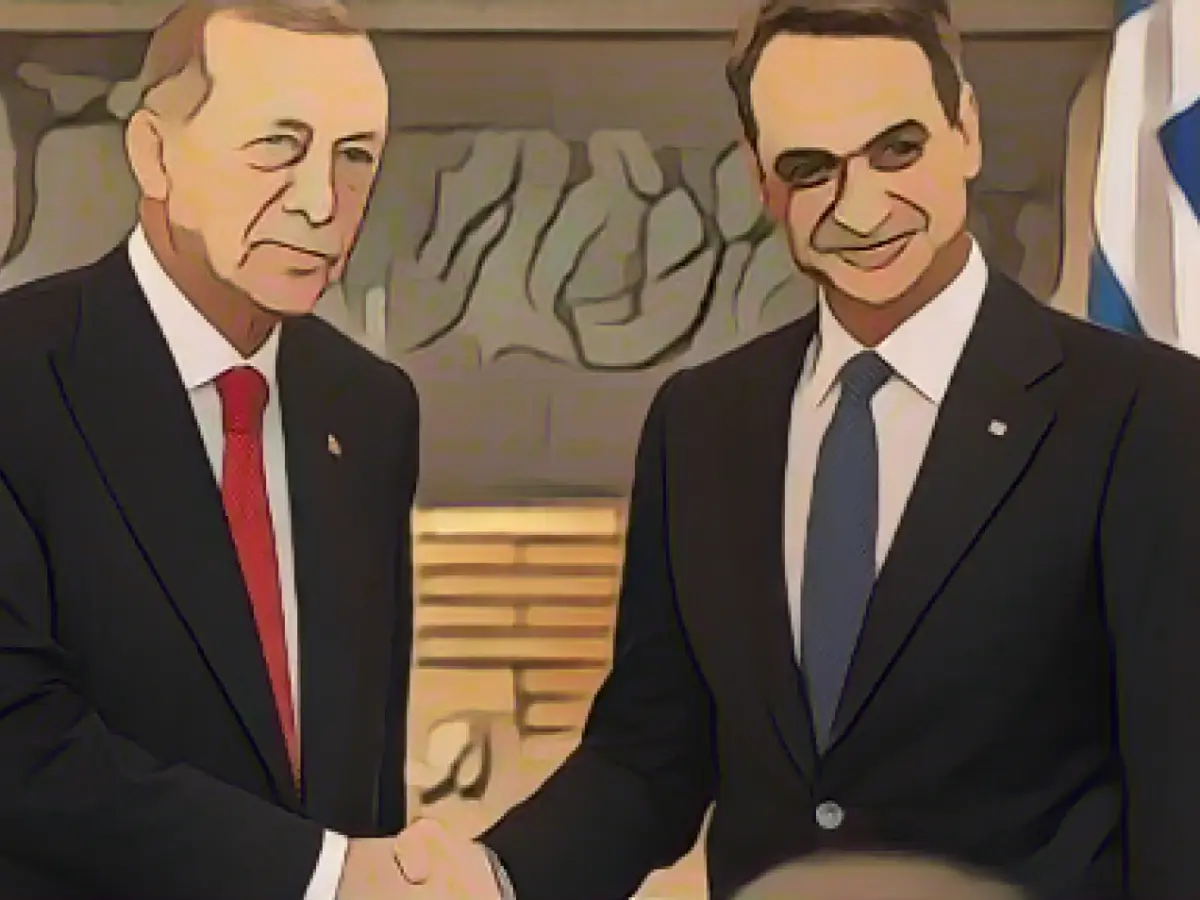Meeting in Athens - Mitsotakis and Erdogan show reconciliation
Was there something? Greece and Turkey were on the brink of war in 2020 due to disputes over natural gas reserves in the eastern Mediterranean. Numerous other conflicts, incidents, side blows and accusations followed. In May of last year, President Recep Tayyip Erdogan even declared the Greek head of government persona non grata: Kyriakos Mitsotakis did not exist for him, he said.
It was only after the severe earthquakes in Turkey in February of this year, when Greece rushed to help, that the dust settled. The new détente culminated in a meeting between the two heads of state and government in Athens, which could not have been more optimistic.
Long talks and a return visit
Mitsotakis and Erdogan spoke for so long that the joint statements were delayed. They had signed a declaration of "friendly relations and good neighborly relations", Mitsotakis reported afterwards, visibly proud. Erdogan also seemed pleased and confirmed that the talks had been very productive. He had invited Mitsotakis for a return visit. At the same time, numerous ministers from both countries met and agreed on measures in areas such as trade, tourism, migration, energy and technology.
It was the first "High Cooperation Council" in a long time - a kind of working meeting between the two countries at the highest level, which had not taken place since 2016 due to the many conflicts. The ministers presented concrete rapprochement measures. Among other things, it was agreed to double the volume of trade between the two neighboring states and NATO members to 10 billion US dollars (around 9.3 billion euros) over the next five years. Turkish citizens will also be able to obtain one-week visas to spend their vacations on ten Greek islands near the Turkish coast without any problems. Athens had previously obtained approval for this from the EU.
The joint declaration of friendship aims in the same direction: it sets out the will for cooperation between the two governments as well as the desire to improve economic ties, which have the potential to significantly increase prosperity in the region. It was also important to cultivate a spirit of solidarity and to support each other in the face of the many current challenges.
Conciliatory tones, but central problems remain
Neither Erdogan nor Mitsotakis swept the central problems under the carpet - above all the disputes over the exclusive economic zones (EEZs) of the two states and the exploitation of natural gas under the seabed. But they were optimistic and even extremely conciliatory.
"We are two neighboring countries that share the same sea, the same geographical location, the same climate and even the same culture in many areas," said Erdogan. However, even between brothers there can be disagreements, just like disagreements between neighboring countries. That is normal. But: "What counts is the will to resolve them. We want to make the Aegean a sea of peace and cooperation." The two countries could set an example to the world. "I say it openly, there is no problem between us that we cannot solve," said Erdogan.
Mitsotakis was also confident. In recent months, for example, it had been seen that cooperation in the area of migration was already working much better and fewer refugees were reaching Greece. "The next phase of the political dialog, if the conditions are right, could be a rapprochement on the definition of the continental shelf and the Exclusive Economic Zone in the Aegean and Eastern Mediterranean," he said. It was a historic duty to seize the opportunity to return bilateral relations to calm waters.
It remains to be seen whether the mutual assurances will be kept and followed through. Promises, commitments and agreements have been made again and again over many decades. Nevertheless, the Greek head of government has announced that the High Cooperation Council will meet annually in future.
Read also:
- Year of climate records: extreme is the new normal
- Precautionary arrests show Islamist terror threat
- SPD rules out budget resolution before the end of the year
- Numerous oil, gas and coal lobbyists at climate conference
- Despite the earthquake-induced reconciliation, the dispute over natural gas reserves in the eastern Mediterranean, which led to conflicts and incidents between Greece and Turkey in 2020, remains a central problem.
- The meeting in Athens between Kyriakos Mitsotakis and Recep Tayyip Erdogan, marked by optimism, aimed to improve economic ties between the two neighboring NATO members, notably increasing trade to $10 billion over the next five years.
- Mitsotakis and Erdogan agreed to double trade volumes and facilitate Turkish citizens' vacation travel to Greek islands around the Turkish coast, following EU approval granted by Athens.
- The leaders highlighted the need for solidarity as they faced numerous challenges, emphasizing the potential of strengthened economic ties to increase prosperity in the region.
- The dispute over exclusive economic zones (EEZs) and natural gas exploitation under the seabed persists between Greece and Turkey, despite the leaders' conciliatory tones and optimism about resolving the disagreements.
- Despite the challenges, Mitsotakis is confident that cooperation on migration, as well as potential rapprochement on delineating continental shelves and Exclusive Economic Zones, could lead to calm waters in the bilateral relations going forward.
Source: www.stern.de








